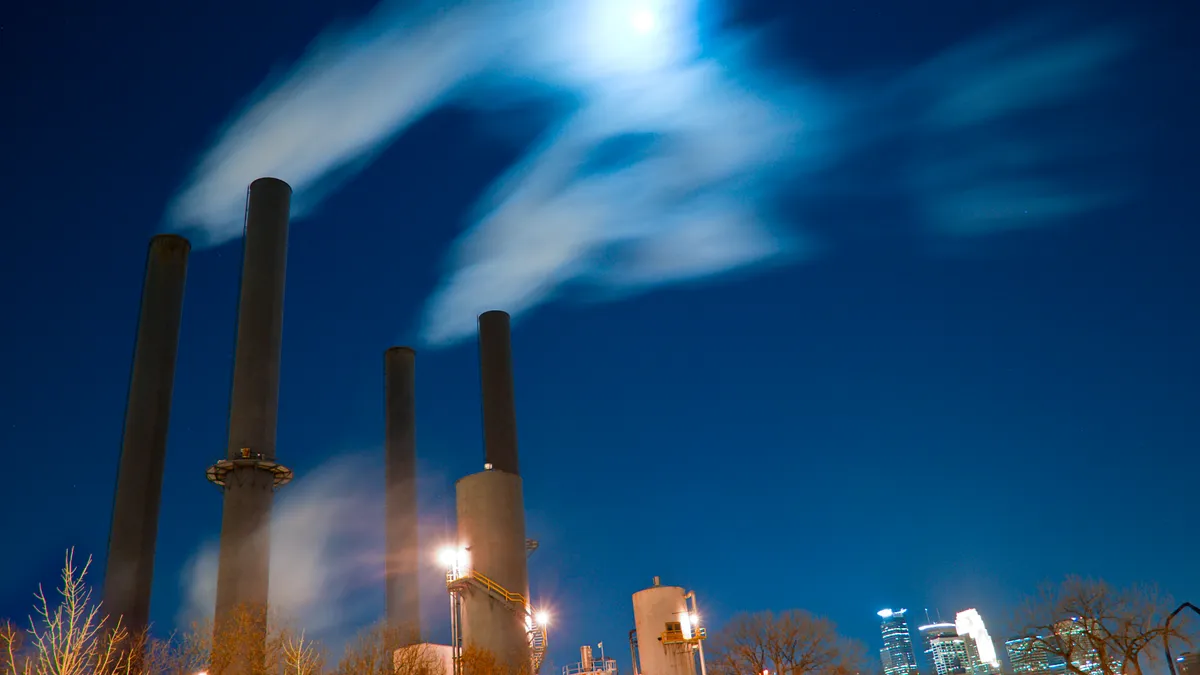Dive Brief:
- U.S. electric utilities were warned of the threats of climate change as early as the 1960s and funded cutting-edge research into the subject in subsequent decades, according to a new report from the Energy and Policy Institute.
- The report, released last week by the left-leaning think tank, highlights utility-funded research into climate change throughout the 1970s and 1980s, but says that by the late '80s, the industry changed course to support organizations skeptical of mainstream climate science.
- The investigation echoes back to media probes into oil giant Exxon Mobil's knowledge of climate change and disclosures of climate risks to investors over the last 30 years. Those concerns sparked an ongoing investigation from the New York Attorney General.
Dive Insight:
The new EPI report argues the nation's largest electric utilities knew about climate change since 1968, when a science advisor to then-President Lyndon Johnson (D) addressed the annual convention of the Edison Electric Institute, the trade group for the nation's investor-owned utilities.
While the science was less developed back then, Donald Horning warned power sector executives that increased CO2 composition in the earth's atmosphere could "produce major consequences on the climate – possibly even triggering catastrophic effects such as have occurred from time to time in the past."
Throughout the 1970s and 1980s, the EPI report cites documents showing utility-funded research into the causes and effects of climate change, largely through EEI and the Electric Power Research Institute (EPRI), a nonprofit research firm funded primarily by power utilities.
In 1977, the EPRI president told Congress if climate change "turns out to be a major concern," it could be an "important justification for expanding the nuclear and solar energy options." The EPRI journal that year also included an investigation into climate change.
Despite the research, by the late 1980s, the report says utilities began advocating against governmental action to address climate change. In 1989, the EEI president told Congress that action to reduce CO2 was "premature at best," and EEI signed on with other major industries to support the Global Climate Coalition, which produced ads to argue against climate initiatives from government.
Today, market changes and state policy initiatives have pushed utilities toward natural gas and renewables, making potential carbon regulation less of a burden for the sector. While independent generators and some individual utilities opposed President Obama's Clean Power Plan, EEI did not sign onto court challenges against the regulatory package to limit emissions from existing plants.
In response to the report, EEI officials told media outlets that the industry has cut carbon emissions over a quarter from 2005 levels. The EPI report claims that's still higher than its emission levels in 1989, when it began advocating against climate action, and points out that some utilities continue to support outside organizations that question climate science, such as the American Coalition for Clean Coal Electricity, the U.S. Chamber of Commerce and the Utility Air Regulatory Group.
The EPI report comes on the heels of shareholder campaigns at a handful of large utilities pressing senior management to detail utility knowledge of climate change risks and plans for the future. In May, PPL shareholders passed a resolution compelling the utility to detail climate plans, and more than 40% of investors at Duke, DTE, Southern and other major companies have backed similar petitions.
In 2015, similar reporting from InsideClimate News into Exxon's knowledge of climate change led to an investigation from New York's Attorney General into whether the company misled investors about potential impacts. That probe, which Exxon dismisses as frivolous, is ongoing.
Correction: This article has been updated to specify that EPRI is an independent nonprofit funded by power utilities, not an arm of EEI itself.













